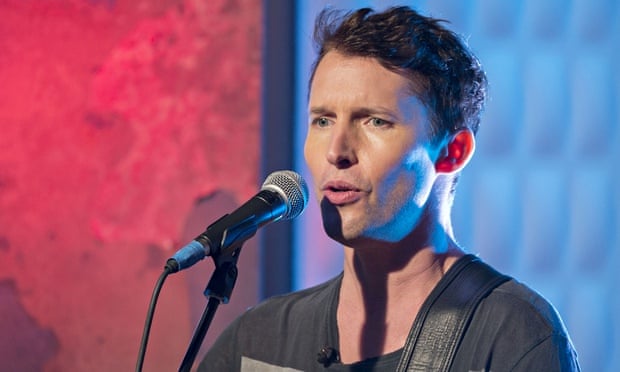The singer said he had to overcome lots of prejudice to make it in the music industry
Singer James Blunt has clashed with Labour politician Chris Bryant about diversity in the arts after the MP said the singer was part of a public school educated elite "dominating" culture.
The singer, who was educated at Harrow,
said the politician was a narrow-minded "classist gimp" who was motivated by the "politics of jealousy".
Politicians, he said, should celebrate success wherever it came from.
The spat started after Mr Bryant, who was recently appointed Labour's shadow arts minister, told the Guardian that there needed to be more working class actors and "gritty" subject matter in drama output to properly reflect contemporary Britain.
'Looking for votes'
While he was "delighted" that Eton-educated Eddie Redmayne had won a Golden Globe for his portrayal of Stephen Hawking in a new film, Mr Bryant - who himself was privately educated at Cheltenham College - suggested that "we can't just have a culture dominated by Eddie Redmayne and James Blunt and their ilk".
Mr Blunt, a former soldier who sprang to fame when his song You're Beautiful went to number one in 2005, took Mr Bryant to task in a letter to the newspaper.
 Mr Bryant suggested there needed to be more of a "level-playing field" in the arts
Mr Bryant suggested there needed to be more of a "level-playing field" in the arts
He said his background - both in terms of his schooling and his time in the army - counted against him when he was trying to break into the music industry and despite his success was still regarded as being "too posh".
"And then you come along, looking for votes, telling working class people that posh people like me don't deserve it and that we must redress the balance," he wrote.
He suggested that Mr Bryant's "populist, envy-based, vote-hunting ideas" were more likely to hold the country back than "my shit songs and my plummy accent".
'Aim high'
Mr Blunt, who has a million followers on Twitter, contrasted carping attitudes to people's success and background in the UK with the US, where he said people "don't give a stuff" about that kind of thing.
 Mr Bryant asked where the next Albert Finney would come from
Mr Bryant asked where the next Albert Finney would come from
"What you teach is the politics of jealousy," he added.
"Perhaps what you have failed to realise is that the only head start my school gave me in the music business, where the vast majority of people are not from boarding school, is to tell me that I should aim high.
"Perhaps it protected me from your kind of narrow-minded, self-defeating, lead-us-to-a-dead-end, 'remove the G from GB thinking' which is to look at others' success and say 'it's not fair'."
'Wasting talent'
In his original interview, Mr Bryant said the system that had produced British talent such as Albert Finney and Glenda Jackson in the 1950s and 1960s had been "more meritocratic".
He questioned whether the BBC, ITV and Channel 4 were committed to funding the kind of drama which looked at Britain as it was now rather than "Downton (Abbey) programming ad infinitum".
Responding to Mr Blunt, the Labour MP insisted he was not singling out the performer and he was "delighted" at his success.
"Stop being so blooming precious," he wrote. "I'm not knocking your success. I even contributed to it by buying one of your albums.
"But it is a statement of the blindingly obvious that that is far tougher if you come from a poor family where you have to hand over your holiday earnings to help pay the family bills."
He added: "You see the thing is I want everyone to take part in the arts. I don't want any no-go areas for young people from less privileged backgrounds. And I'm convinced that we won't be Great Britain if we waste great British talent in the arts."
http://www.bbc.com/news/uk-politics-30884948
James Blunt’s letter to Chris Bryant - in full
James Blunt said people laughed at the idea of him going into the music business. Photograph: Ken McKay/REX
You classist gimp. I happened to go to a boarding school. No one helped me at boarding school to get into the music business. I bought my first guitar with money I saved from holiday jobs (sandwich packing!). I was taught the only four chords I know by a friend. No one at school had ANY knowledge or contacts in the music business, and I was expected to become a soldier or a lawyer or perhaps a stockbroker. So alien was it, that people laughed at the idea of me going into the music business, and certainly no one was of any use.
In the army, again, people thought it was a mad idea. None of them knew anyone in the business either.
And when I left the army, going against everyone’s advice, EVERYONE I met in the British music industry told me there was no way it would work for me because I was too posh. One record company even asked if I could speak in a different accent. (I told them I could try Russian).
Every step of the way, my background has been AGAINST me succeeding in the music business. And when I have managed to break through, I was STILL scoffed at for being too posh for the industry.
And then you come along, looking for votes, telling working class people that posh people like me don’t deserve it, and that we must redress the balance. But it is your populist, envy-based, vote-hunting ideas which make our country crap, far more than me and my shit songs, and my plummy accent.
I got signed in America, where they don’t give a stuff about, or even understand what you mean by me and “my ilk”, you prejudiced wazzock, and I worked my arse off. What you teach is the politics of jealousy. Rather than celebrating success and figuring out how we can all exploit it further as the Americans do, you instead talk about how we can hobble that success and “level the playing field”. Perhaps what you’ve failed to realise is that the only head-start my school gave me in the music business, where the VAST majority of people are NOT from boarding school, is to tell me that I should aim high. Perhaps it protected me from your kind of narrow-minded, self-defeating, lead-us-to-a-dead-end, remove-the-‘G’-from-‘GB’ thinking, which is to look at others’ success and say, “it’s not fair.”
Up yours,
James Cucking Funt
http://www.theguardian.com/music/2015/jan/19/james-blunts-letter-chris-bryant-in-full
Chris Bryant’s reply to James Blunt – in full
Chris Bryant, Labour MP, writes: ‘I don’t want any no-go areas for young people from less privileged backgrounds.’ Photograph: David Levene for the Guardian
Dear James
Stop being so blooming precious. I’m not knocking your success. I even contributed to it by buying one of your albums. I’m not knocking Eddie Redmayne, either. He was the best Richard II I have ever seen.
If you’d read the whole of my interview, you’d have seen that I make the point that the people who subsidise the arts the most are artists themselves. Of course that includes you. But it is a statement of the blindingly obvious that that is far tougher if you come from a poor family where you have to hand over your holiday earnings to help pay the family bills.
I’m delighted you’ve done well for yourself. But it is really tough forging a career in the arts if you can’t afford the enormous fees for drama school, if you don’t know anybody who can give you a leg up, if your parents can’t subsidise you for a few years whilst you make your name and if you can’t afford to take on an unpaid internship.
You see the thing is I want everyone to take part in the arts. I don’t want any no-go areas for young people from less privileged backgrounds. And I’m convinced that we won’t be Great Britain if we waste great British talent in the arts. You seem to think talent will always out. My fear is that someone like Stanley Baker, the son of a disabled miner in the Rhondda, who rose to be one of Britain’s greatest film actors (Zulu), would have found it even harder to make it today.
That’s why we need more diversity at every level in the arts – in education, in training, on-screen, on stage and backstage – and we need to break down all the barriers to taking part so that every talent gets a chance.
Yours bluntly
Chris
http://www.theguardian.com/politics/2015/jan/19/chris-bryant-letter-james-blunt-in-full


.jpeg)
.jpg)







